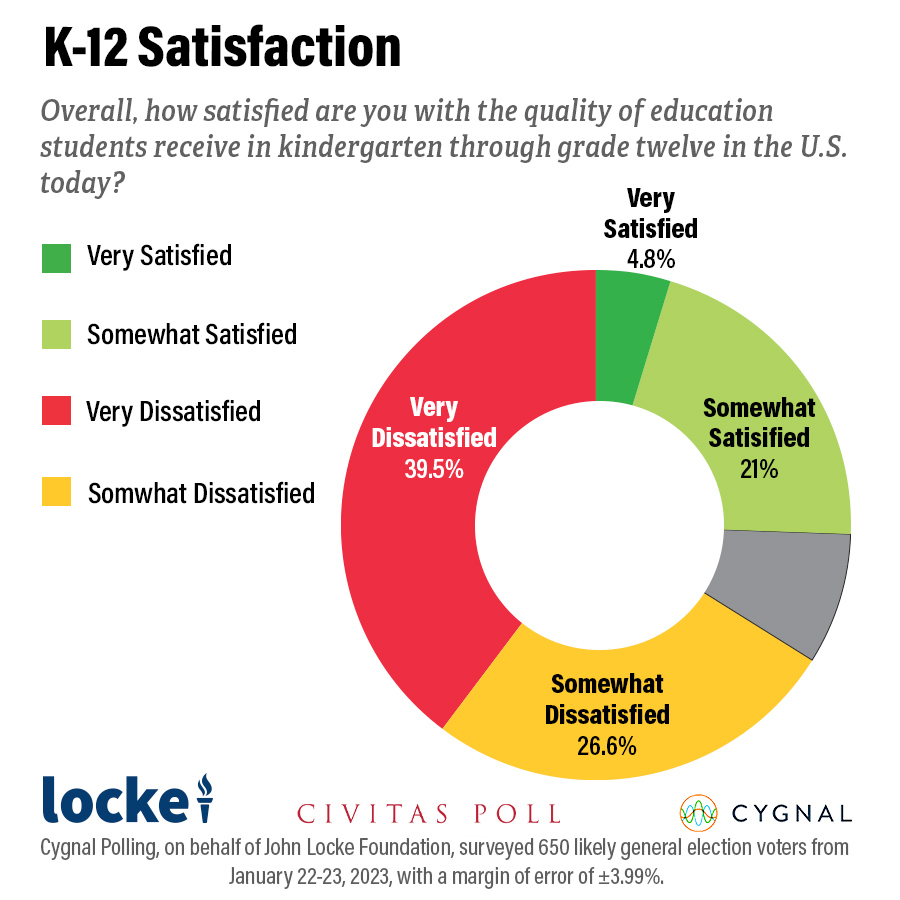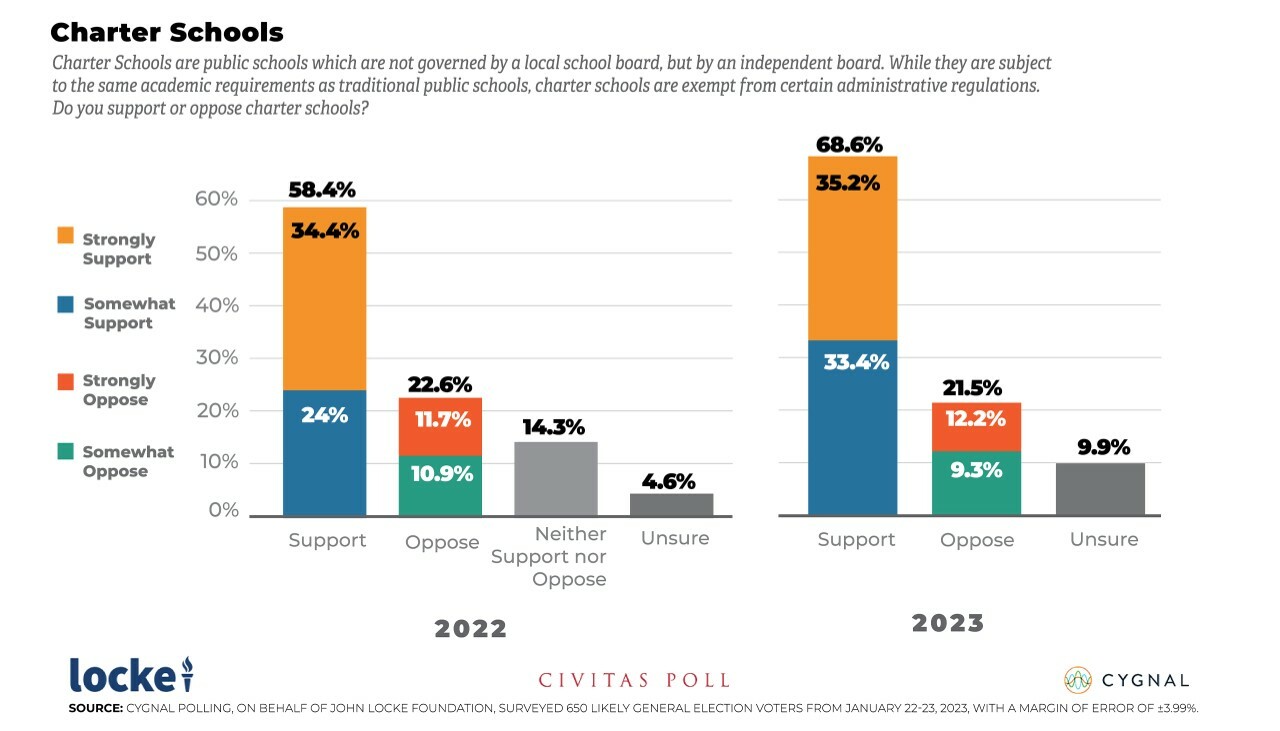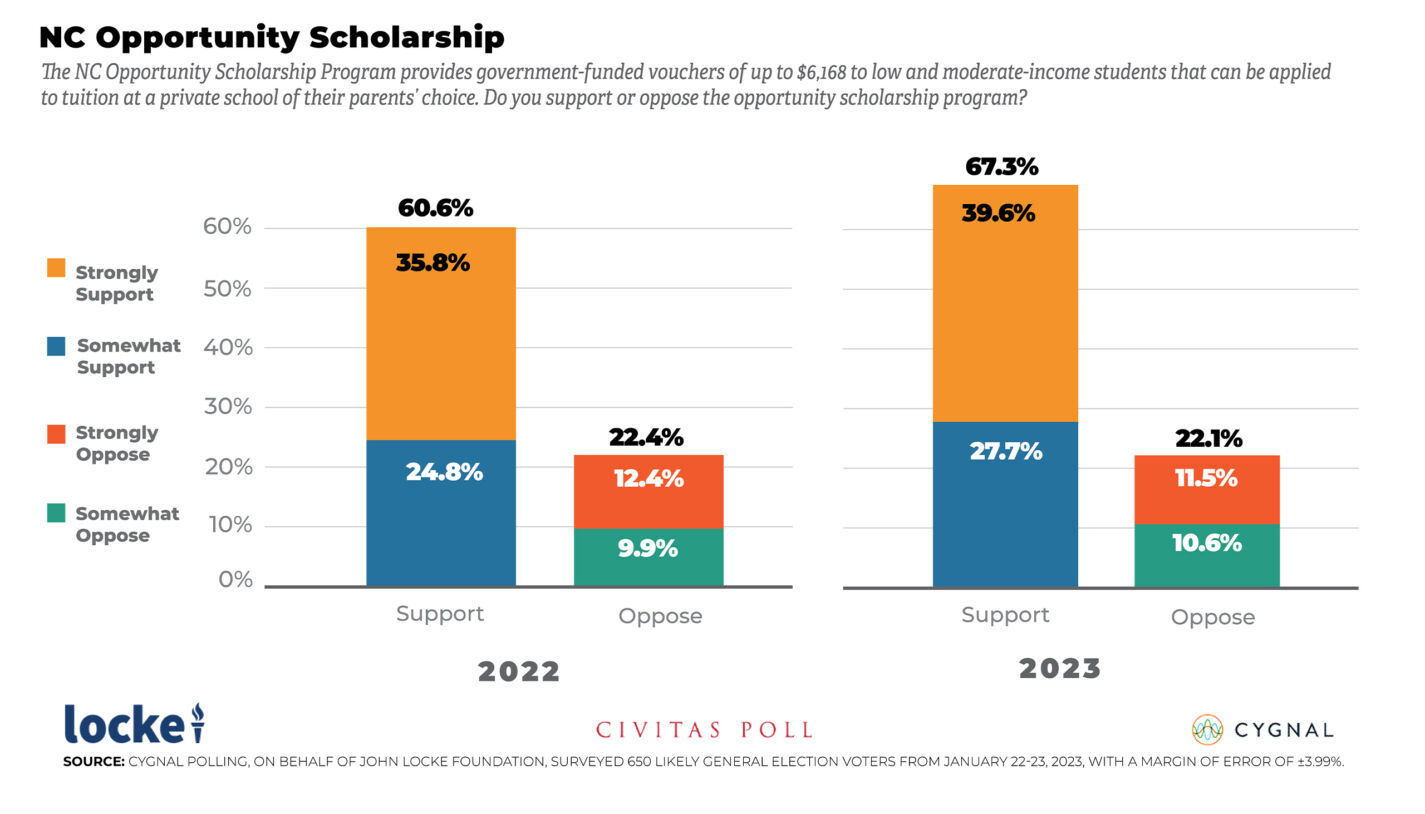Poll finds parental choice gaining popularity in North Carolina
Published February 2, 2023
By Bob Luebke
A new Civitas Poll of likely voters found strong support both for parental choice and for school choice programs. There is general dissatisfaction with the quality of the education and how schools are addressing issues important to parents, such as learning loss.
The poll of 600 likely general election voters was conducted January 22–23, 2023. It has a margin of error of +/- 3.99 percent.
Poll results provide the public and school choice supporters with cause for both concern and hope. First the bad news. When asked how satisfied they were with the quality of education students are receiving in kindergarten through grade 12, nearly two-thirds of respondents (66.1 percent) chose “Dissatisfied.” Only about 26 percent chose “Satisfied,” while eight percent of respondents were “Unsure.”

Respondents were also dissatisfied with how North Carolina is addressing the issue of learning loss in the schools. When asked to describe how well North Carolina is addressing this issue, 48.5 percent chose “Dissatisfied.” Twenty percent chose “Adequate,” while 21.9 percent said they were “Unsure.” Only nine percent chose “Satisfied.”
Among those dissatisfied with how the public schools are addressing learning loss, the most common response (33.3 percent) given was, “Teachers and schools have not focused resources and staff on the problem.” On this plus side, the poll underscored strong support for parents having the primary role in directing the education of their children. An overwhelming 82.9 percent of respondents believe “the child’s parents or guardians” are best suited to determine where a child should attend school. That’s up slightly from 81.4 percent last year.
Also worth noting is that support for parents is strong across the political spectrum with Republicans (89 percent), Democrats (75 percent), and Independents (85 percent) all affirming overwhelmingly the rights of parents and guardians to choose where their children attend school. Only about 12 percent of respondents said that local school boards should make those decisions.
A plurality of respondents (28 percent) believe parents are largely responsible for educational outcomes. Another 24 percent said the State Board of Education, while 12 percent said local boards of education. The percentages for the top two responses are fairly close. The high number of response for State Board of Education may reflect growing frustration over the quality of education.
A strong jump in support for existing choice programs is one of the biggest takeaways from the poll.

Nearly seven in 10 (69 percent) respondents expressed support for charter schools, with only 22 percent of respondents voicing opposition. That’s a jump in support of 11 percentage points over last year when 58 percent of respondents said they support charter schools. Also noteworthy is that 55 percent of Democrats, 74 percent of Independents, and 78 percent of Republicans said they support charter schools. Support for charter schools among Blacks (58 percent) was less than Whites (71 percent) but still very strong.
Support for the state’s largest publicly-funded school choice program, the North Carolina Opportunity Scholarship Program, also increased. Over two-thirds of respondents (67.3 percent) said they support the Opportunity Scholarship program, while 22 percent of respondents opposed it. Support showed an increase of six full percentage points from last year (61 percent). Also impressive is how evenly this program is supported across party lines, receiving 67 percent support from Republicans, 67 percent from Democrats, and 66 percent from Independents. Minority support for Opportunity Scholarships was especially strong, with 74 percent of Black respondents voicing support for the program, compared with 65 percent for Whites.

The poll also asked respondents about Education Savings Accounts (ESAs), which are state-funded and parent-controlled checking accounts that allow parents to pay educational expenses like tuition, tutoring, online education programs, therapies for special-needs students, and textbooks or other instructional materials. Sixty-eight percent of respondents said they favored the concept of an ESA. Less than one in five respondents (18 percent) said they opposed ESAs. Even though conservative Republicans have been the primary champions of ESAs, the accounts received noticeably greater support from Democrats (74 percent) and Independents (71 percent) than Republicans (61 percent).
Lastly the poll asked specifically about using an Education Savings Account to help address the issue of learning loss. Results were again encouraging to school choice advocates. About 65 percent of respondents supported creation of a learning loss ESA, 16 percent opposed the idea, and 19 percent of respondents were unsure. Somewhat surprisingly, support for Learning Loss ESAs by Democrats (68 percent) and Independents (67 percent) tops Republicans (57 percent) by a healthy margin. Similarly, Black support for Learning Loss ESAs (73 percent) bested White support (62 percent) by 11 percentage points.
Results of the January Civitas Poll on school choice give advocates of educational freedom much to cheer about. The growing dissatisfaction with the quality of K-12 public education and frustration with how schools have responded to learning loss have fueled a school choice resurgence.
The majority of respondents believe parents are responsible for the educational outcomes of their children and should be able to choose where their children are educated. These sentiments have also reverberated in higher levels of support for school choice programs, which crosses political and racial categories. They should encourage legislation that empowers all parents to choose how and where children are educated.







